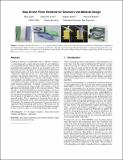Data-driven finite elements for geometry and material design
Author(s)
Chen, Desai; Levin, David I. W.; Sueda, Shinjiro; Matusik, Wojciech
Downloadchen-matusik.pdf (6.542Mb)
OPEN_ACCESS_POLICY
Open Access Policy
Creative Commons Attribution-Noncommercial-Share Alike
Terms of use
Metadata
Show full item recordAbstract
Crafting the behavior of a deformable object is difficult---whether it is a biomechanically accurate character model or a new multimaterial 3D printable design. Getting it right requires constant iteration, performed either manually or driven by an automated system. Unfortunately, Previous algorithms for accelerating three-dimensional finite element analysis of elastic objects suffer from expensive precomputation stages that rely on a priori knowledge of the object's geometry and material composition. In this paper we introduce Data-Driven Finite Elements as a solution to this problem. Given a material palette, our method constructs a metamaterial library which is reusable for subsequent simulations, regardless of object geometry and/or material composition. At runtime, we perform fast coarsening of a simulation mesh using a simple table lookup to select the appropriate metamaterial model for the coarsened elements. When the object's material distribution or geometry changes, we do not need to update the metamaterial library---we simply need to update the metamaterial assignments to the coarsened elements. An important advantage of our approach is that it is applicable to non-linear material models. This is important for designing objects that undergo finite deformation (such as those produced by multimaterial 3D printing). Our method yields speed gains of up to two orders of magnitude while maintaining good accuracy. We demonstrate the effectiveness of the method on both virtual and 3D printed examples in order to show its utility as a tool for deformable object design.
Date issued
2015-08Department
Massachusetts Institute of Technology. Computer Science and Artificial Intelligence Laboratory; Massachusetts Institute of Technology. Department of Electrical Engineering and Computer ScienceJournal
ACM Transactions on Graphics
Publisher
Association for Computing Machinery (ACM)
Citation
Desai Chen, David I. W. Levin, Shinjiro Sueda, and Wojciech Matusik. 2015. Data-driven finite elements for geometry and material design. ACM Trans. Graph. 34, 4, Article 74 (July 2015), 10 pages.
Version: Author's final manuscript
ISSN
07300301